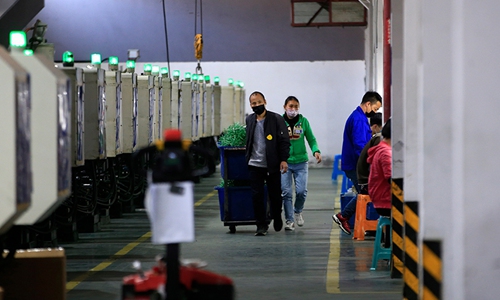Selective tariff on manufacturers expanded to lower tax pressure
Source:Global Times Published: 2020/4/14 22:38:40

Two parts manufacturers in Cixi, East China's Zhejiang Province - local high-tech heavyweight DEGSON Electronics and export-oriented generator maker Deying Motor - are both operating at full throttle. Some of their staffers work extra shifts. But both express concerns over the outlook for the market amid the coronavirus pandemic. Yang Hui/GT
China will expand the trial of choosing selective tariffs for manufacturers to all comprehensive bonded warehouses. The expansion is aimed at helping export companies to survive the decline in overseas orders and explore the domestic market amid the global spread of the coronavirus, experts said.
The policy, according to the General Administration of Customs, will allow manufacturers operating in the bonded warehouses and selling their products to the domestic market to declare their products either as imported raw materials or as finished or partly finished products, depending on their assessment of the convenience and the tax pressure on their companies.
The selective tariffs are aimed at stabilizing the foreign trade situation and expanding the conversion from exports to domestic sales, Bai Ming, deputy director of the Ministry of Commerce's International Market Research Institute, told the Global Times on Tuesday.
"Due to the epidemic, it is difficult for enterprises to export to the European and US markets, so they need to transfer to the Chinese market. The selective tariff policy can reduce the tariff burden on enterprises and help them survive," Bai said.
It also enables the export products to enter the domestic market at relatively low cost, Shi Jianxun, an economics professor at the School of Economics and Management of Tongji University, told the Global Times on Tuesday.
"There is large potential in terms of domestic demand for imported products during the coronavirus pandemic as long as the export goods are of good quality. With the coronavirus, Chinese consumers can no longer shop overseas or as they did in the past," Shi said.
The policy may be further expanded in the future, said Dong Dengxin, director of the Finance and Securities Institute at Wuhan University.
To further ease the pressure on manufacturing companies, the State Council also said that from April 15 companies selling products to the domestic market will be spared tax-deferred interest until December 31.
Posted in: MARKETS